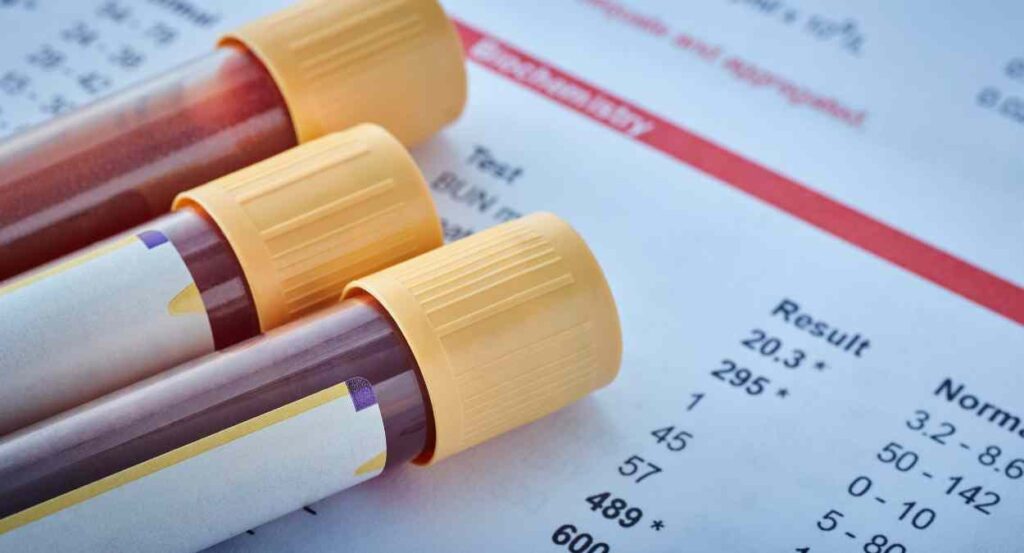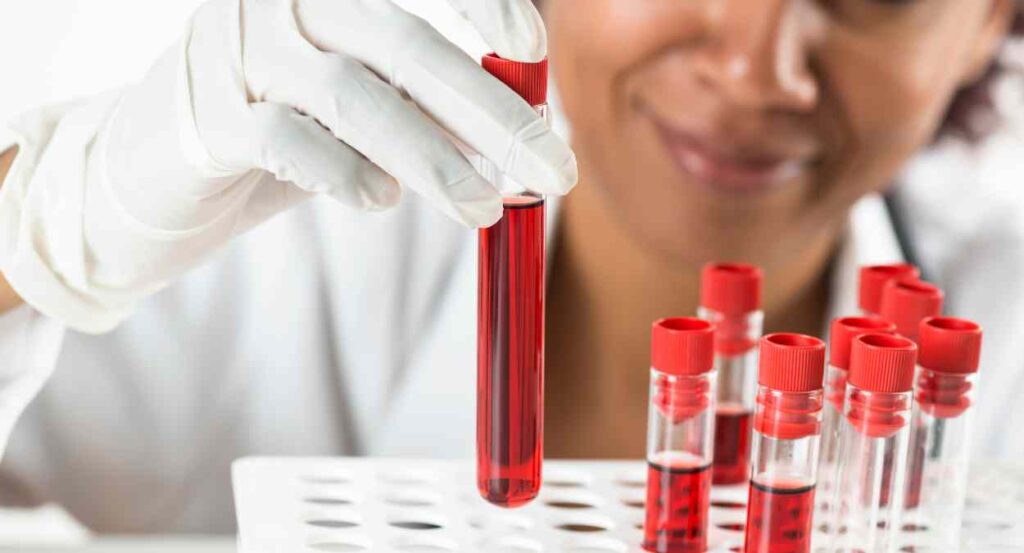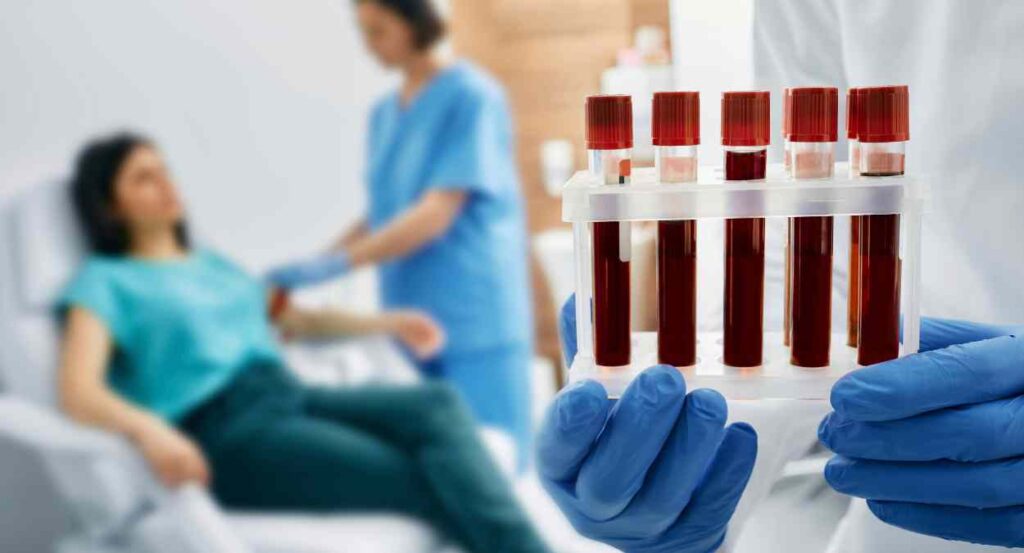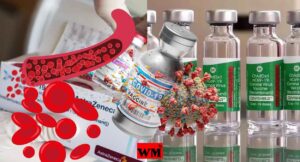Understanding Blood Tests is now easy
We often get confused to see the report of blood tests, As you know Blood tests are an essential tool that doctors use to monitor your health, detect diseases early, and manage ongoing conditions. When you get lab results back, the numbers and terms can be confusing. In this article we are going to discuss Blood tests, It will help you understand common blood tests and what they mean.

What Happens During a Blood Test
A phlebotomist will clean your arm with an antiseptic and wrap an elastic band around it to make the veins swell with blood. They will insert a small needle into your vein and collect blood samples in vials. The amount taken is usually less than a teaspoon. You may feel a quick pinch but collecting blood is generally quick and painless.
After your blood is collected, the vials are labelled and sent to a lab for analysis. Skilled technicians and high-tech equipment in the lab test for levels of various components in your blood. The results are sent back to your doctor who will discuss them with you and explain what they indicate about your health.
Complete Blood Count (CBC)
One of the most common blood panels ordered is a complete blood count or CBC. This provides a broad overview of the cells circulating in your bloodstream:
- Red blood cells (RBC): Also known as erythrocytes, these cells carry oxygen from your lungs to tissues all over your body. Low RBC or haemoglobin levels indicate anaemia.
- White blood cells (WBC): Also called leukocytes, these cells fight infection. High WBC indicates an inflammatory response which could mean you have an infection or autoimmune disorder.
- Platelets: These tiny cell fragments are essential for blood clotting. Low platelet levels can lead to excessive bruising and bleeding.

Thyroid Panel
This panel checks levels of thyroid hormones which regulate your metabolism. The main ones are:
- TSH (thyroid stimulating hormone): Produced by the pituitary gland, TSH stimulates the thyroid to release T3 and T4. High TSH indicates hypothyroidism.
- T3 (triiodothyronine) and T4 (thyroxine): Produced by the thyroid gland, these hormones regulate growth, heart rate, digestion, and other processes. Low T3 and T4 indicate an underactive thyroid.
Hemoglobin A1C
This test measures your average blood sugar levels over the past 2-3 months. It does this by looking at glycosylated haemoglobin or HbA1c. This forms when excess glucose in your bloodstream binds to haemoglobin.
- Normal HbA1c is below 5.7%. An elevated HbA1c indicates you may have diabetes or prediabetes. It can also help monitor diabetes treatment.
Basic Metabolic Panel
The BMP provides a snapshot of your metabolism, fluid balance, and kidney function by testing:
- Glucose: Blood sugar at the time of test. Fasting glucose is typically 70-100 mg/dL.
- Electrolytes: Sodium, potassium, chloride, CO2. These minerals are essential for muscle, nerve, and heart function.
- Kidney function tests: BUN (blood urea nitrogen) and creatinine indicate how well your kidneys filter waste from blood.
- Calcium: This mineral is key for healthy bones, nerves, and muscles. Normal range is 8.5-10.5 mg/dL.

Liver Function Panel
This checks levels of proteins, enzymes, and bilirubin which are produced by the liver. Tests include:
- Albumin: Made by the liver, this protein prevents fluid leaking from blood vessels. Low levels indicate liver or kidney disease.
- ALT and AST: These liver enzymes are released when liver cells are damaged. Elevated levels signal liver injury or inflammation.
- Alkaline phosphatase: This enzyme is present in bile ducts, bone, kidney, liver, and placenta. High levels can mean liver or bone disease.
- Bilirubin: A product of red blood cell breakdown. Elevated bilirubin may indicate liver disease or blocked bile ducts.
Lipid Panel
This panel measures fats and cholesterol in your blood to assess heart disease risk. Key tests are:
- Total cholesterol: Below 200 mg/dL is considered healthy. 201-239 mg/dL is borderline high. Over 240 mg/dL is high.
- HDL (good) cholesterol: Higher levels above 60 mg/dL protect against heart disease. Below 40 mg/dL is considered too low.
- LDL (bad) cholesterol: Optimal is below 100 mg/dL. 130-159 mg/dL is borderline high. Over 160 mg/dL is considered high.
- Triglycerides: Below 150 mg/dL is ideal. Borderline is 150-199 mg/dL. Over 200 mg/dL is high.
What Else Can Blood Tests Show?
Many other blood tests can detect issues with organs, screen for various diseases, or monitor medications:
- Kidney tests: BUN, creatinine, and electrolyte levels help assess kidney function.
- Bone tests: Calcium, phosphorus, and alkaline phosphatase levels indicate bone health.
- Infection tests: CRP checks for inflammation. ESR looks at the red blood cell sedimentation rate. Both rise when infection is present.
- Cancer tumour marker tests: PSA screens for prostate cancer. AFP detects liver cancer. CA-125 flags ovarian cancer.
- Cardiac tests: Troponin levels help diagnose heart attacks. CK, CK-MB, and LDH help detect heart muscle damage.
- Drug tests: Levels of medications like lithium, phenytoin, or immunosuppressants ensure proper dosing.

Tips for Understanding Blood Test Results
- Focus on the reference range rather than absolute numbers. This indicates what’s normal for the lab conducting your test.
- Look at trends over time instead of individual results. Seeing if your cholesterol or glucose is going up or down matters most.
- Repeat tests if a result seems abnormal. Lab errors and outliers happen. Confirm an unusual result with a retest.
- Ask your doctor to explain the tests they order and what the results mean for your health. Don’t hesitate to ask questions.
- Keep a file with copies of your lab reports. This allows you to track changes over time.

FAQs About Blood Tests
What should I do to prepare for a blood test?
For most tests, no preparation is needed other than drinking water beforehand to stay hydrated. If you are getting a fasting glucose test, do not eat or drink anything except water for 8-12 hours beforehand.
Will a blood test hurt?
You will feel a quick pinprick when the needle goes in but collecting the blood sample is generally a quick, painless procedure. Applying pressure after prevents bruising. Tell the phlebotomist if you have small veins or anxiety about needles.
How long does it take to get blood test results?
Routine blood test results are usually available within 24-48 hours but can take 3-5 days. More specialized tests can take up to two weeks. Ask your healthcare provider when you can expect results.
What if my results show something abnormal?
Don’t panic if you get one abnormal result. Your doctor will likely repeat the test to confirm it was not a lab error. If an issue is detected, your physician will order follow-up testing and discuss treatment options with you.
Do I need to fast for every blood test?
Fasting is only required for blood tests measuring your baseline glucose, cholesterol, triglycerides or other metabolites that are affected by food intake. For other tests, you can eat and take medications normally before.
How often should I get a physical exam and blood work?
The American Academy of Family Physicians recommends a yearly checkup and blood tests starting at age 40 for men and 50 for women. Those with health conditions may need to be monitored more frequently.
What is a normal haemoglobin level?
Normal ranges for hemoglobin are: Men 13.5-17.5 g/dL, Women 12.0-15.5 g/dL. Levels below or above this reference range indicate you may be anaemic or have a condition affecting your red blood cells.
Conclusion
Blood testing provides doctors and patients with objective data about their health status. Understanding common blood tests and learning to interpret your results enables you to be an active participant in your care. Monitoring your blood work over time can motivate you to make diet and lifestyle changes to achieve wellness goals and improve your numbers. If you have any concerns about your results, be sure to follow up promptly with your physician.
Disclaimer: This article provides general information about common blood tests and normal reference ranges. It should not substitute for medical advice, diagnosis or treatment provided by a doctor or other qualified health provider. Please consult your physician regarding any concerns about your test results.
Also Read:
Does Alternating Arms For Vaccines Improve Immune Response?
Cervical Cancer in India: A Comprehensive Guide on Risk Factors, Symptoms, Prevention and Treatment
90-30-50 Diet Plan: A Balanced Nutrition Plan For Your Optimum Health
The Unexpected Fat Burning Power Of Ghee, How To Take Ghee For Weight Loss?
Discover India’s Top 25 Vipassana Meditation centre For Life Transformation






























